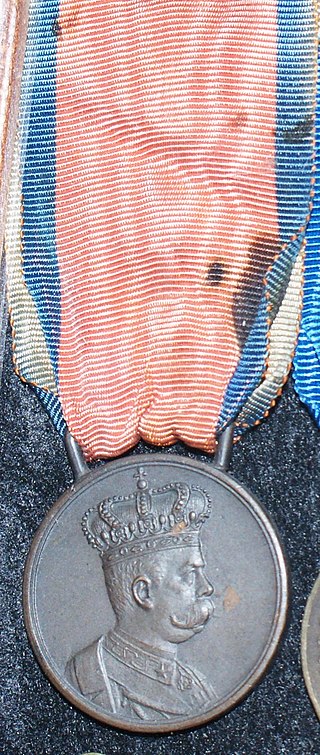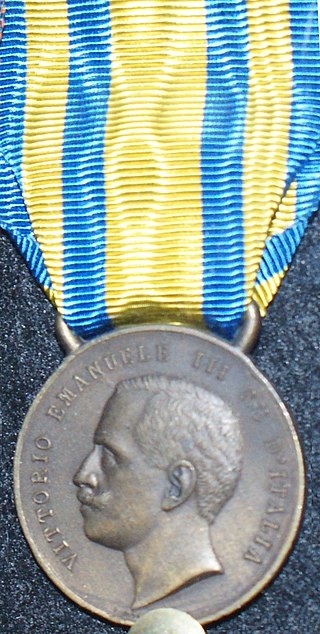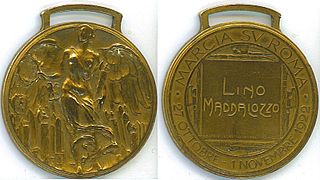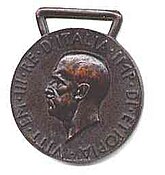
Garbagna Novarese is a comune (municipality) in the Province of Novara in the Italian region Piedmont, located about 80 kilometres (50 mi) northeast of Turin and about 7 kilometres (4.3 mi) southeast of Novara. Notable the Palazzo Caroelli.

Ubaldo Soddu was an Italian general and politician who held the position of Deputy Chief of Staff of the Army and Undersecretary of State for War during the initial phases of World War II. On 13 June 1940, immediately after the outbreak of hostilities with France and the United Kingdom, he assumed the position of deputy chief of the General Staff. Promoted to army general, he replaced general Sebastiano Visconti Prasca as commander of the Albanian Higher Troop Command during the Greco-Italian War on 8 November 1940. Because of the defeat Italian troops suffered between 22 and 23 November 1940, he was replaced after four weeks in command by the Italian Royal Army's chief of staff, General Ugo Cavallero.

The Gazzetta Ufficiale della Repubblica Italiana is the official journal of record of the Italian government. It is published by the Istituto Poligrafico e Zecca dello Stato in Rome.

The Commemorative Medal for the Italo-Turkish War 1911–12 was a decoration granted by the Kingdom of Italy to personnel who participated in the Italo-Turkish War of 1911–1912. It was abolished in 2011 after the Italian Republic deemed it obsolete.

The Italian honours system is a means to reward achievements or service to the Italian Republic, formerly the Kingdom of Italy, including the Italian Social Republic.

Vincenzo de Feo was an Italian Admiral. He served as Governor of Italian Eritrea during 1937.

Umberto Klinger was an aviator, Italian politician and entrepreneur.
The fusion of Italian municipalities is the physical-territorial union between two or more contiguous comuni.

The Commemorative Medal of the War of Liberation is a decoration awarded by the Italian Republic to personnel who participated in military and partisan operations of the Italian co-belligerent forces or the Italian resistance movement against the Axis powers during the Italian campaign of World War II and the coincident Italian Civil War. It originated in 1945 as the Kingdom of Italy's Badge of the Ongoing War of Liberation Against the Germans, which the Italian Republic replaced with the Liberation War Badge in 1948. In turn, the Commemorative Medal of the War of Liberation replaced the Liberation War Badge in 1959.

The Commemorative Medal of the War Period 1940–43 is a decoration awarded by the Italian Republic to personnel who served in the Italian Armed Forces or certain civilian entities of the Government of Italy during Fascist Italy's participation in World War II on the side of the Axis powers between 1940 and 1943. It originated in 1941 as Fascist Italy's Badge of the 1940–1943 War Period, which the Italian Republic replaced with an identical badge of the same name in 1948. In turn, the Commemorative Medal of the War Period 1940–43 replaced the Badge of the 1940–1943 War Period in 1959.

The Commemorative Medal of the Spanish Campaign was a decoration awarded by the Kingdom of Italy during its period of Fascist rule under Prime Minister Benito Mussolini to personnel who took part in the Italian military intervention in Spain during the Spanish Civil War of 1936–1939.

The Commemorative Medal of the African Campaigns was a decoration established in 1894 by the Kingdom of Italy for personnel who took part in Italian military operations in Africa between 1887 and 1896 as the Italian Empire began its expansion during the Scramble for Africa. As the Italian Empire expanded in East Africa, the medal's applicability was extended in 1906 and 1923 to include additional service in the region.
The Badge of Honor for the "Volunteers of Freedom" Patriots is an award established by the Kingdom of Italy to recognize those who participated in the armed struggle of the Italian resistance movement or Italian Co-belligerent Forces against Axis forces in Italy during World War II or who refused to collaborate with Axis forces after being taken prisoner by Nazi Germany.

The Commemorative Medal of the Libyan Campaigns was a decoration granted by the Kingdom of Italy to personnel who served in military campaigns in Libya after the conclusion of the Italo-Turkish War of 1911–1912. It was abolished in 2011 after the Italian Republic deemed it obsolete.

The Commemorative Medal of the Campaign in China was a decoration granted by the Kingdom of Italy to personnel who served in 1900–1901 in the military campaign of the Eight-Nation Alliance, which intervened in the Boxer Rebellion in China to relieve the siege of the International Legations in Peking, and its immediate aftermath. A "China" variant of the medal later was created to recognize service on occupation duty in China between 1902 and 1908. Both variants of the medal were abolished in 2011 after the Italian Republic deemed them obsolete.
The Cross for Length of Military Service is a military medal created by the Kingdom of Italy which then passed to the Italian Republic. Created in 1900 and updated or reformed in 1953, 1966, 1972, and 2010, it is a seniority award which recognizes lengthy honorable service in the Italian armed forces.
The Medal of Merit for the Avezzano Earthquake of 1915 was a medal established by the Kingdom of Italy in 1915 to recognize service in support of relief efforts related to the 1915 Avezzano earthquake. In 1916, a certificate of honorable mention was established to recognize relief service in connection with the earthquake which did not rise to a level meeting the criteria for the medal itself.

The Commemorative Medal of the Fiume Expedition was a decoration granted by the Kingdom of Italy to personnel who took part in the Italian seizure and occupation of Fiume after World War I. It originated in 1919 as the Commemorative Medal of the Ronchi March, a decoration of the Italian Regency of Carnaro, and was adopted by the Kingdom of Italy in 1926.

The Commemorative Medal of the March on Rome was a decoration granted by the Kingdom of Italy to recognize the October 1922 March on Rome. The march pressured the Italian government into appointing Benito Mussolini prime minister of Italy and began Fascist rule and what the National Fascist Party deemed the "Era Fascista".
The Commemorative Medal of the Decennial Air Cruise was a decoration granted by the Kingdom of Italy to personnel who participated in or supported the Decennial Air Cruise in 1933. It was abolished in 2010 after the Italian Republic deemed it obsolete.


















